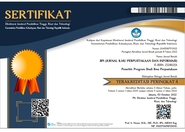Fenomena Belajar Agama Generasi Millenial: Studi Kasus Pada Mahasiswa Fakultas Sains di Perguruan Tinggi Keagamaan Islam
Abstract
Keywords
Full Text:
PDFReferences
Budiargo, Dian. (2015). Berkomunikasi Ala Net Generation. Jakarta: Eles Media Komputindo
Cahyono, Anang Sugeng. (2020). Pengaruh Media Sosial Terhadap Perubahan Sosial Masyarakat di Indonesia. Jurnal Unita, 4 (2), 29-37.
Crabtree, V. (2015). The Internet and Religion. Retrieved from http://www.humanreligious.info/internet.html
Dawson, L. L. & D. E. C. (2004). Religion Online: Finding Faith on the Internet. London: Rutledge.
Denison, Barbara Jones Denison (Ed). 2011. History, Time, Meaning, and Memory Ideas for the Sociology of Religion. Leiden: Brill
Dewi, Nur Kumala. (2021) Konsep Aplikasi E-Dakwah Untuk Generasi Millenial Jakarta. Jurnal IKRA-ITH Informatika Jakarta, hal 26-33 Vol. 5 No. 1 Tahun 2021
Hatta, Muhammad. (2017). Agama dan Budaya Media. Communicatus: Jurnal Ilmu Komunikasi. Vol 1 Nomor 1 Tahun 2017.
Masngud. (2010). "Pengaruh Intensitas Pemanfaatan Weblog PAI terhadap Prestasi Belajar PAI Siswa SMA Negeri 6 Yogyakarta", Tesis. Yogyakarta: UIN Sunan Kalijaga
Nugraha, F. (2016). Model dan etika penyuluhan agama di internet. Balai Diklat Keagamaan, IX(Bandung), 139-149.
Padgett, D. . (2016). Qualitative Methods in Social Work Research, 36(Sage Publications).
Paisal. (2020). Dampak Media Sosial Terhadap Perilaku Keagamaan Remaja Di Desa Barakkae Kec. Lamuru Kab. Bone. Skripsi. Makassar: UIN Alauddin Makassar
Sadida, N. (2018). Belajar Islam di Media Sosial, (May), 1-4.
Safrawali. (2021). Belajar Agama Islam di Era Digital. Jurnal Al-Tijarah, 4 (1), 70-82
Sumadi, Suryabrata. (2016). Psikologi Kepribadian. Jakarta: PT. Grasindo
Sutopo, O. R. (2010). Beragam Islam , Beragam Ekspresi : Islam Indonesia dalam Praktik, 15(2), 85-97.
Wahidin, Asep. (2014). Pengaruh Penggunaan Internet Terhadap Religiusitas Mahasiswa Universitas Islam Bandung. Bandung: UIN Sunan Gunung Djati Bandung.
Wulandari, Novi. (2018). Pemanfaatan Sosial Facebook Sebagai Media Belajar Pendidikan Agama Untuk Meningkatkan Motivasi Dan Hasil Belajar Siswa. Jurnal Tarbiyatuna 3 (1), 82-106
DOI: http://dx.doi.org/10.30829/jipi.v7i2.22036
Refbacks
- There are currently no refbacks.
Copyright (c) 2024 Abdi Mubarak Syam, Nurul Huda Prasetiya

This work is licensed under a Creative Commons Attribution-ShareAlike 4.0 International License.










_1.png)
.png)
_.png)

